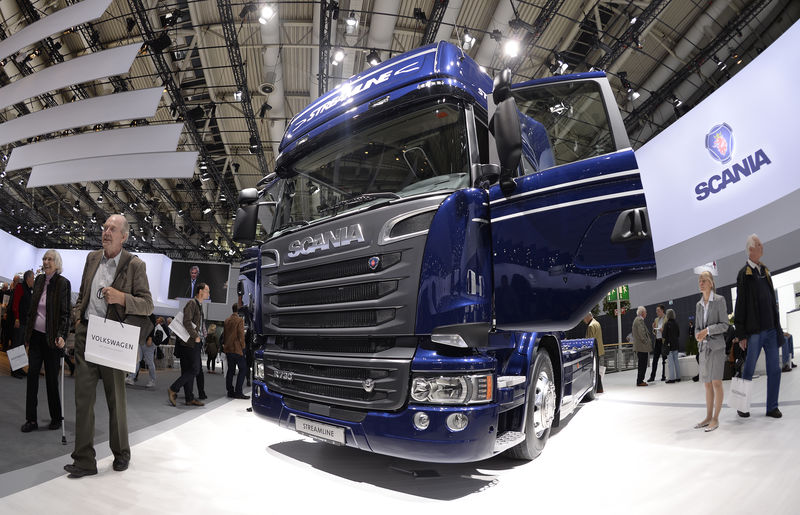By Esha Vaish
STOCKHOLM (Reuters) - Volkswagen-owned truckmaker Scania said on Thursday that demand in China had bounced back since the start of this year, but it was bracing for a potentially significant drop in UK orders if Britain leaves the EU under a "hard" Brexit.
Scania is part of Volkswagen's Traton truck unit, whose planned initial public offering in April was pulled by VW on Wednesday until market conditions improve.
In November, Scania said demand in China for trucks and buses was down 10 to 15 percent from previous quarters and customers were forecasting fewer vehicle purchases for the next six months.
However, CEO Henrik Henriksson said on Thursday that conditions had improved and Chinese demand was rebounding to the "same level" as before the fourth-quarter slowdown as growing e-commerce has led customers to resume purchasing Scania's high-mileage trucks.
"Requests coming in from our customers especially the big ones, they tended to slow down the pace of renewing their fleet (in the fourth quarter). But it looks like now the market is coming back," Henriksson told Reuters by phone.
In Europe, Britain's scheduled departure from the European Union at the end of this month has added headaches for an auto industry already grappling with fallouts from trade wars and the slowdown in the Chinese market.
If Britain leaves the EU without a withdrawal agreement, a so-called "hard" Brexit, it would revert to WTO rules and accompanying tariffs, increasing the cost of vehicle imports into Britain.
Henriksson said Scania had seen a spike in UK orders in the fourth quarter of last year due to buying ahead of Brexit and it had rushed to deliver those orders in January and February, anticipating delays at the UK border after the March end exit deadline.
"What we have also done is prepare ourselves if there would be a hard Brexit... but if it would be a hard Brexit, then we expect that the market will drop significantly," Henriksson said.
Scania has lengthened the times it needs to bring UK-sourced components to production and has worked out alternative shipping routes for trucks made in Holland and Belgium to be delivered to the UK.
Within the EU, trucks drive smoothly through border checks. But firms worry that vehicles will be backed up at ports and queued up on feeder roads on both sides of the Channel if a hard Brexit delays each truck at customs by even a few minutes.
"That's why we have the extra buffer," Henriksson said.
Rival AB Volvo had triggered its hard Brexit contingency plans in December, building "safety stock" in Britain and considering alternative shipping routes.
"We hope that even if there are disturbances, it should be short term when it's in everyone's interest to try and find a solution to make sure that we can continue to trade, whatever the Brexit deal will be," Henriksson said.
Regarding the delay to the IPO of Traton - which includes the MAN, Scania and Volkswagen (DE:VOWG_p) trucks and buses businesses - Henriksson said Scania would deliver its strategies "regardless of the capital structure".

"We have found a modus operandi of how... we will develop base technology between Scania and MAN, but also how we will differentiate... ourselves in the market. That strategy feels very solid and we will continue to deliver on it," he said.